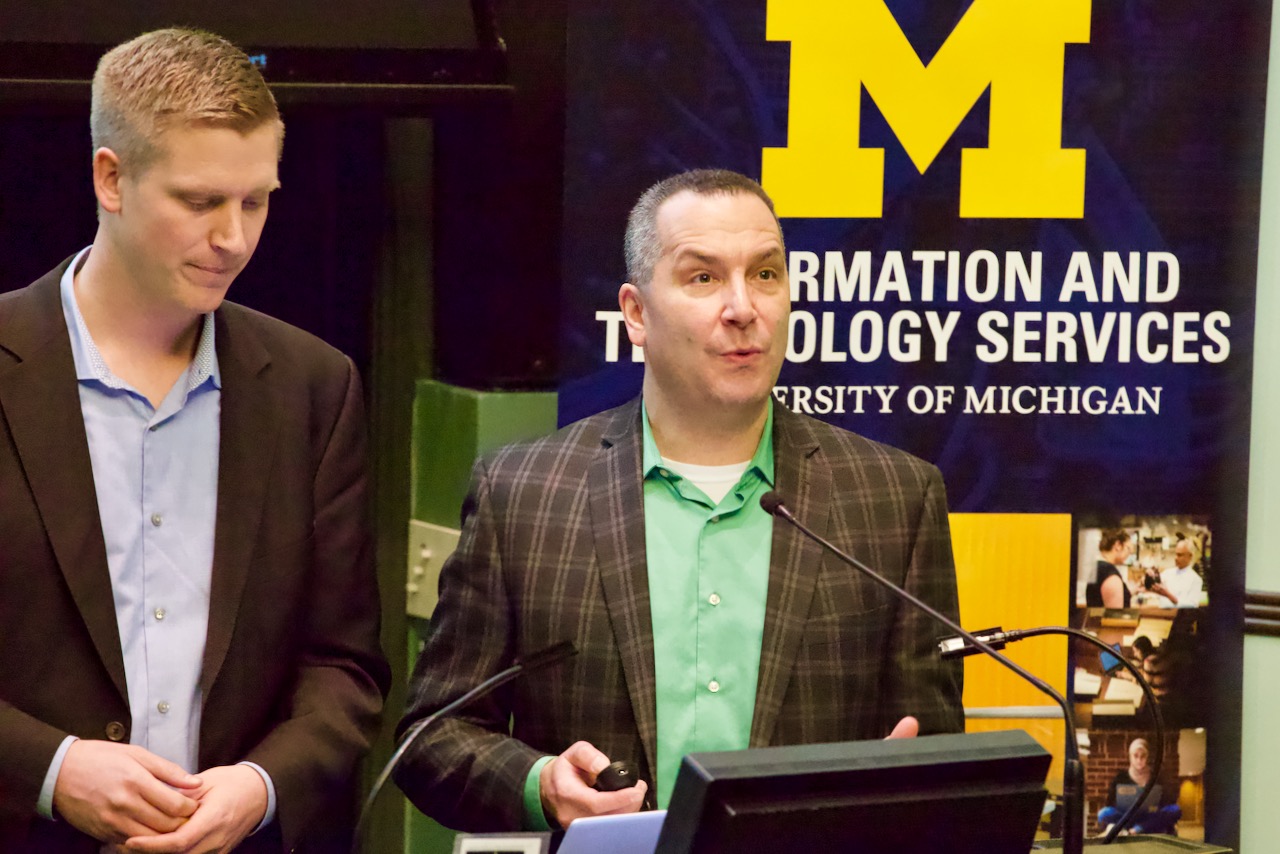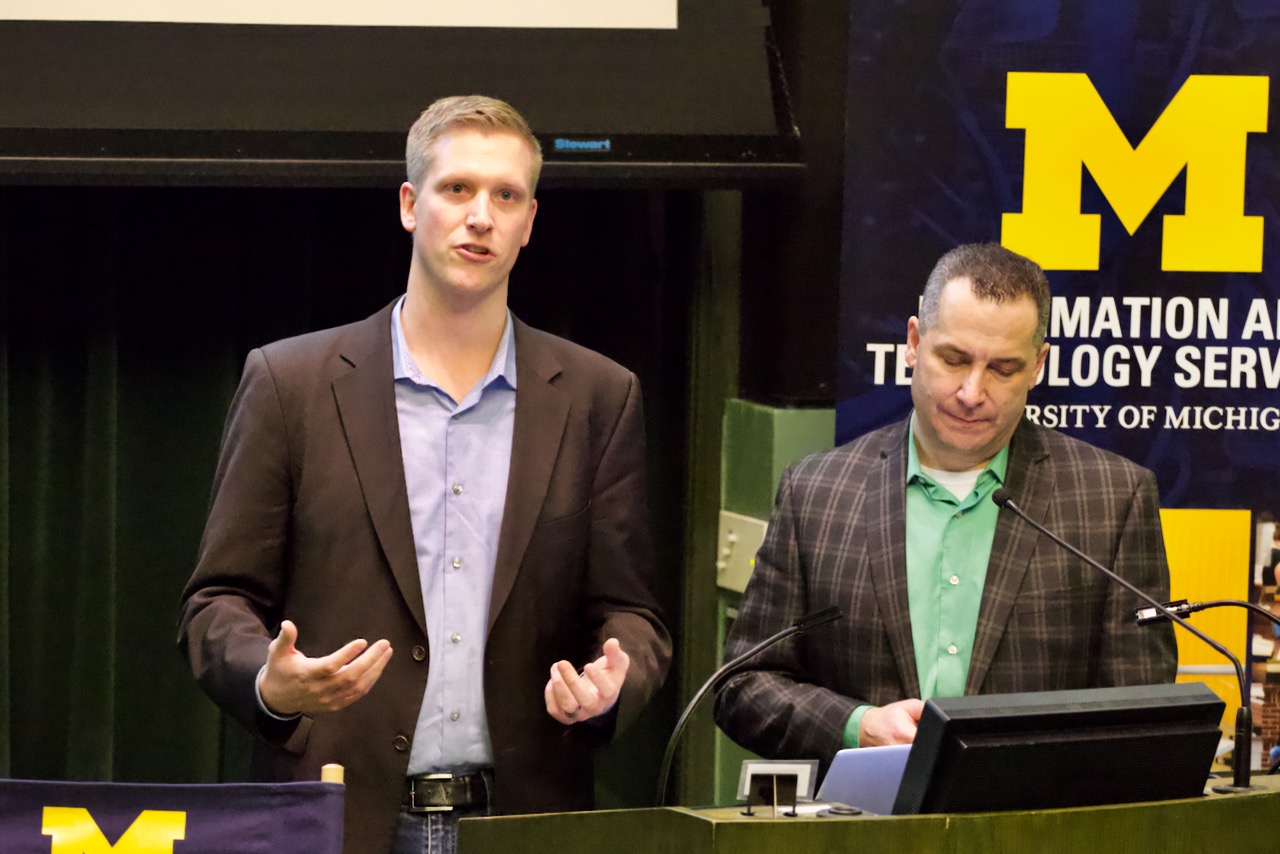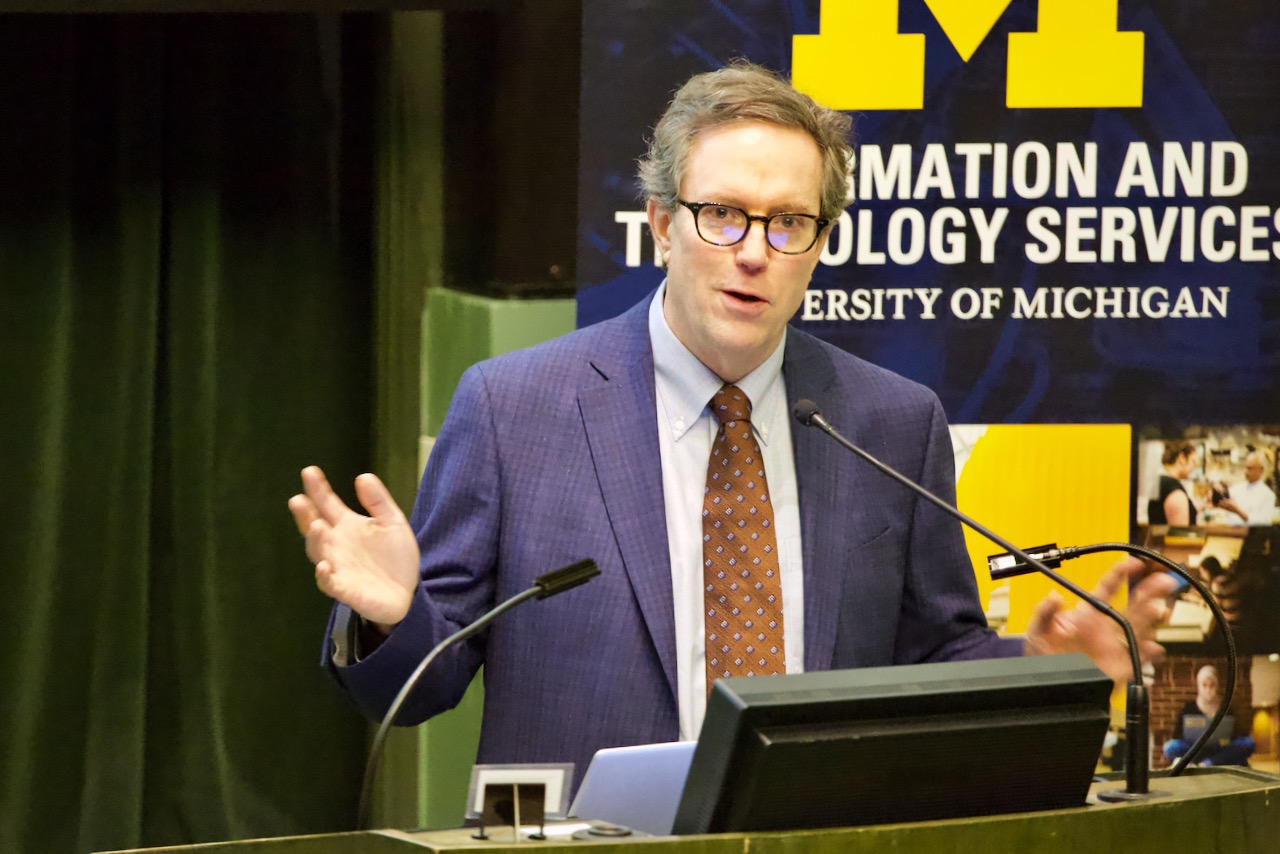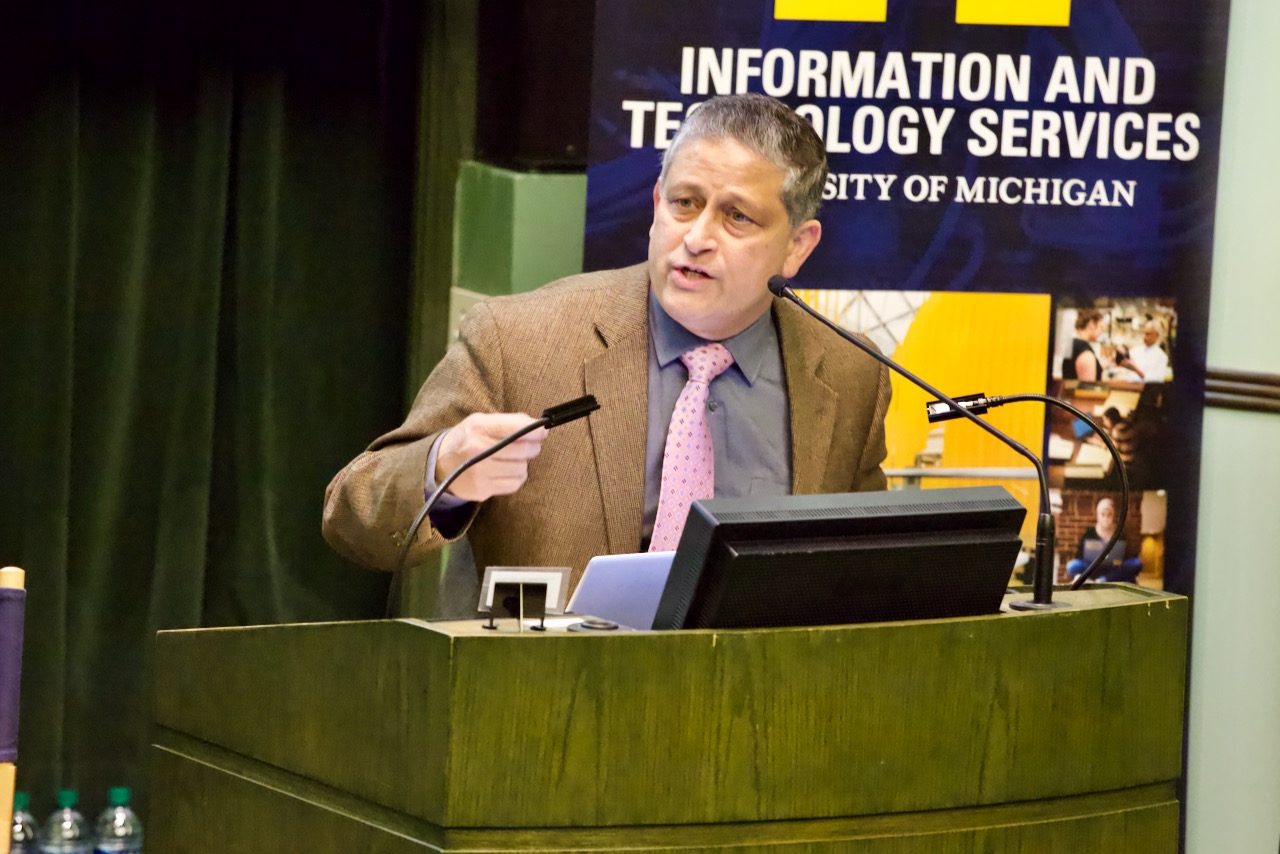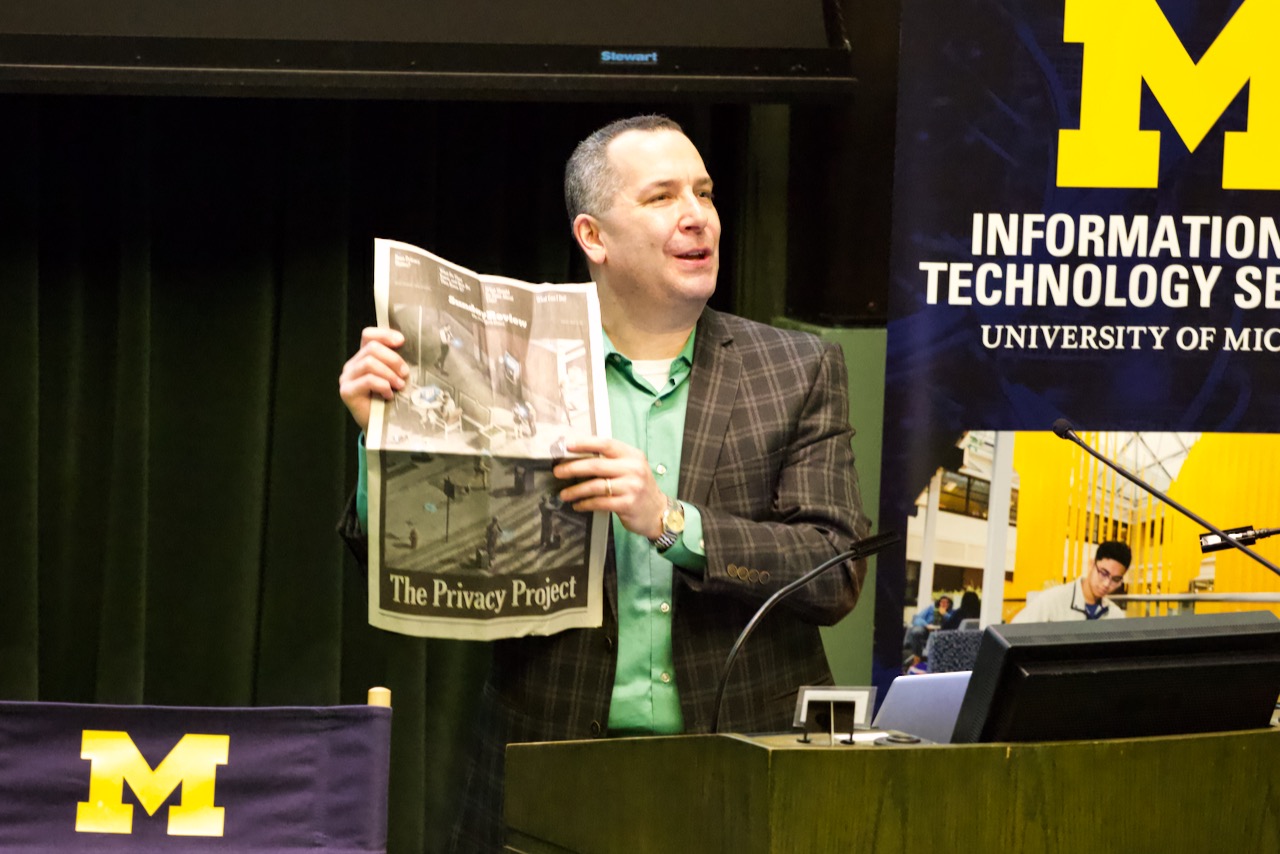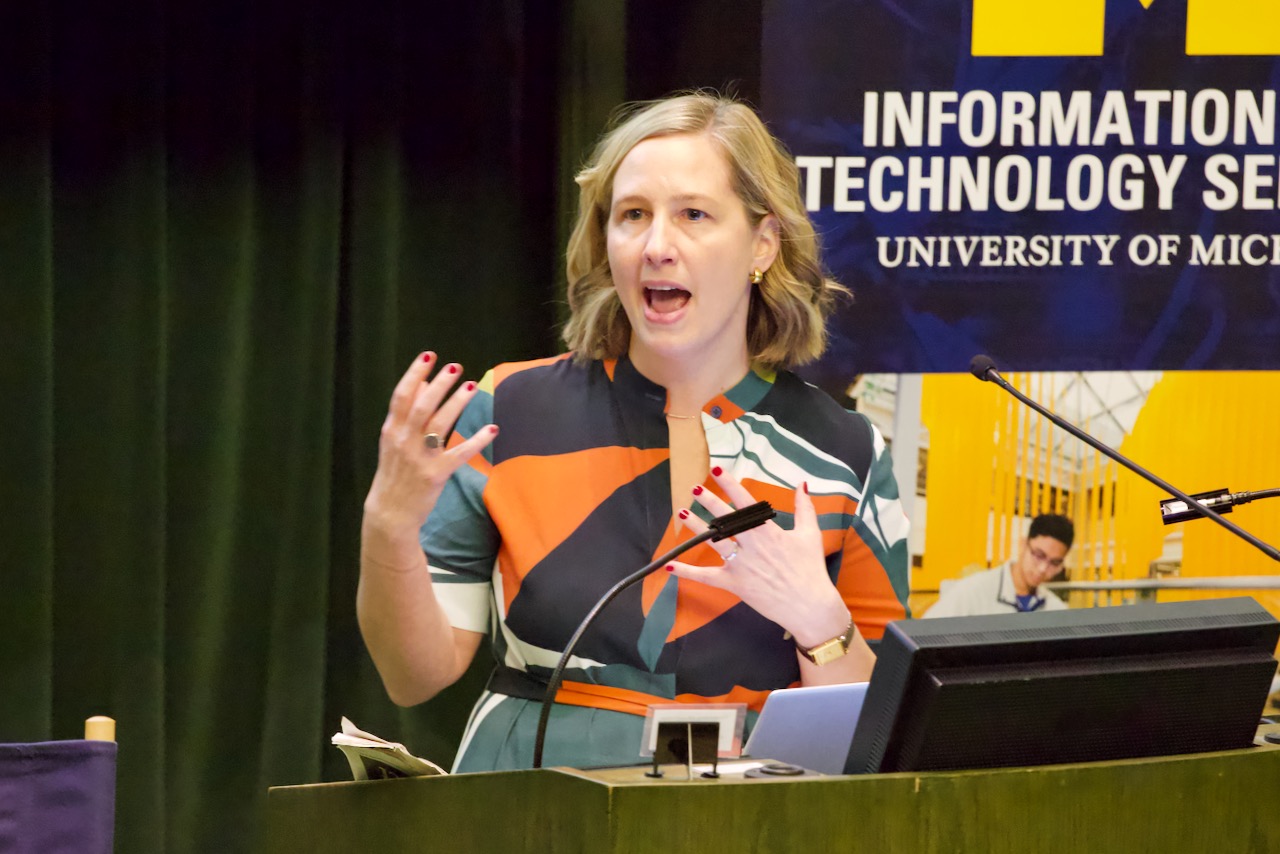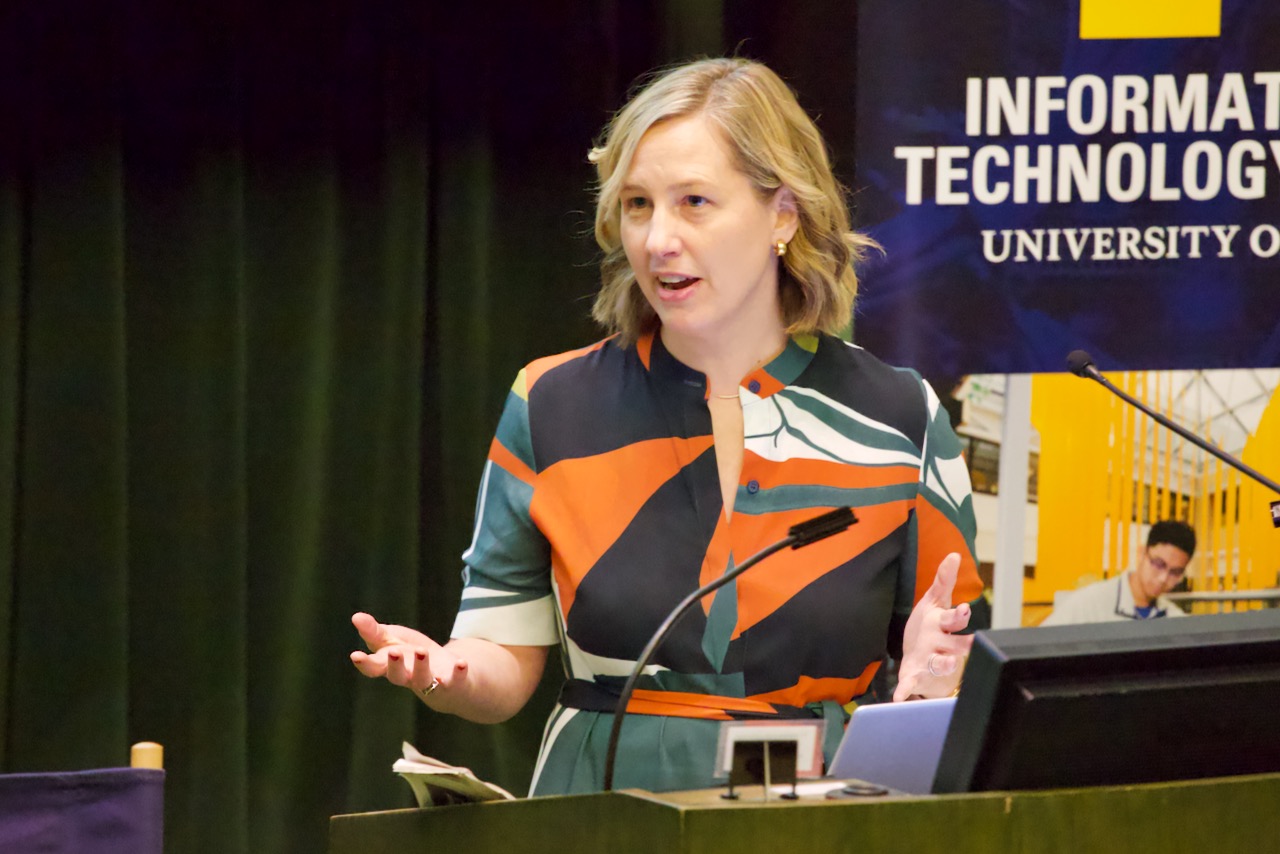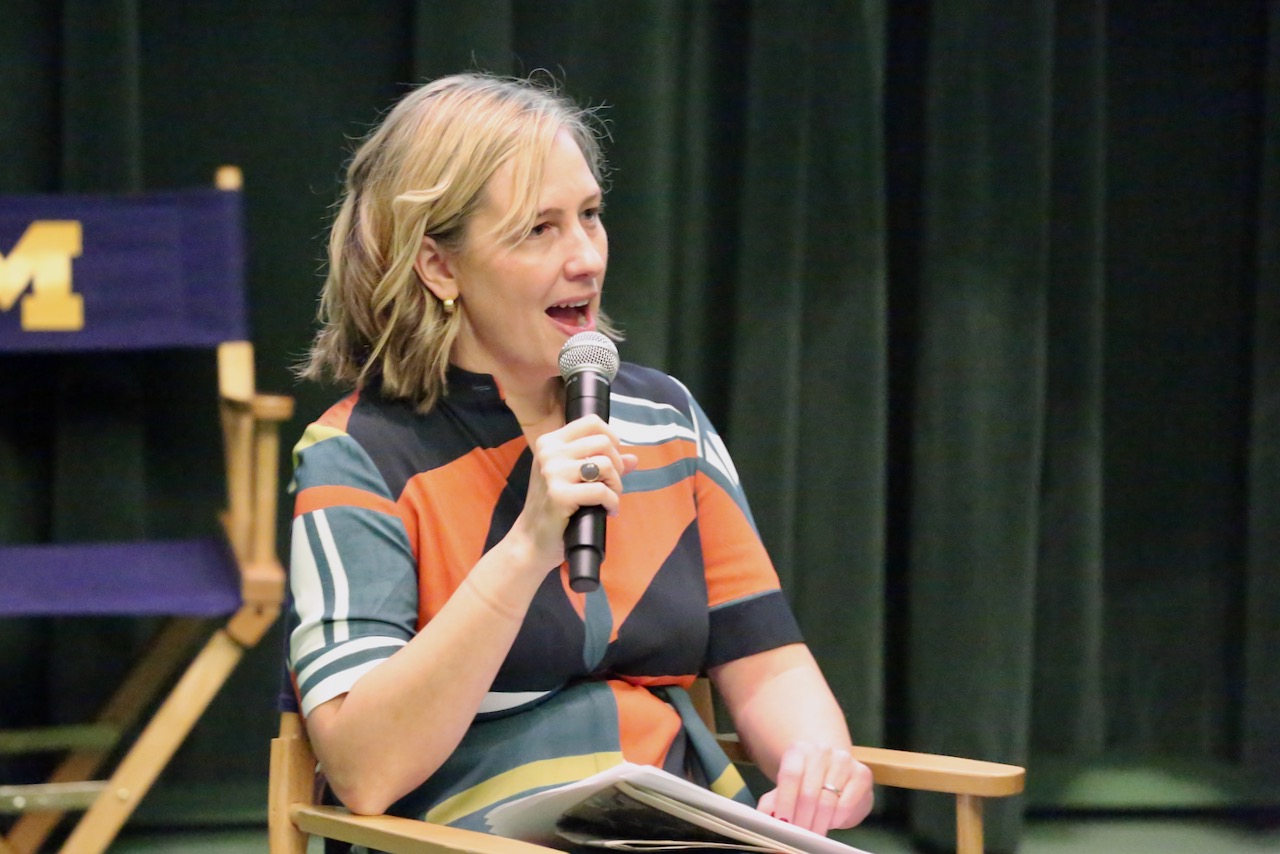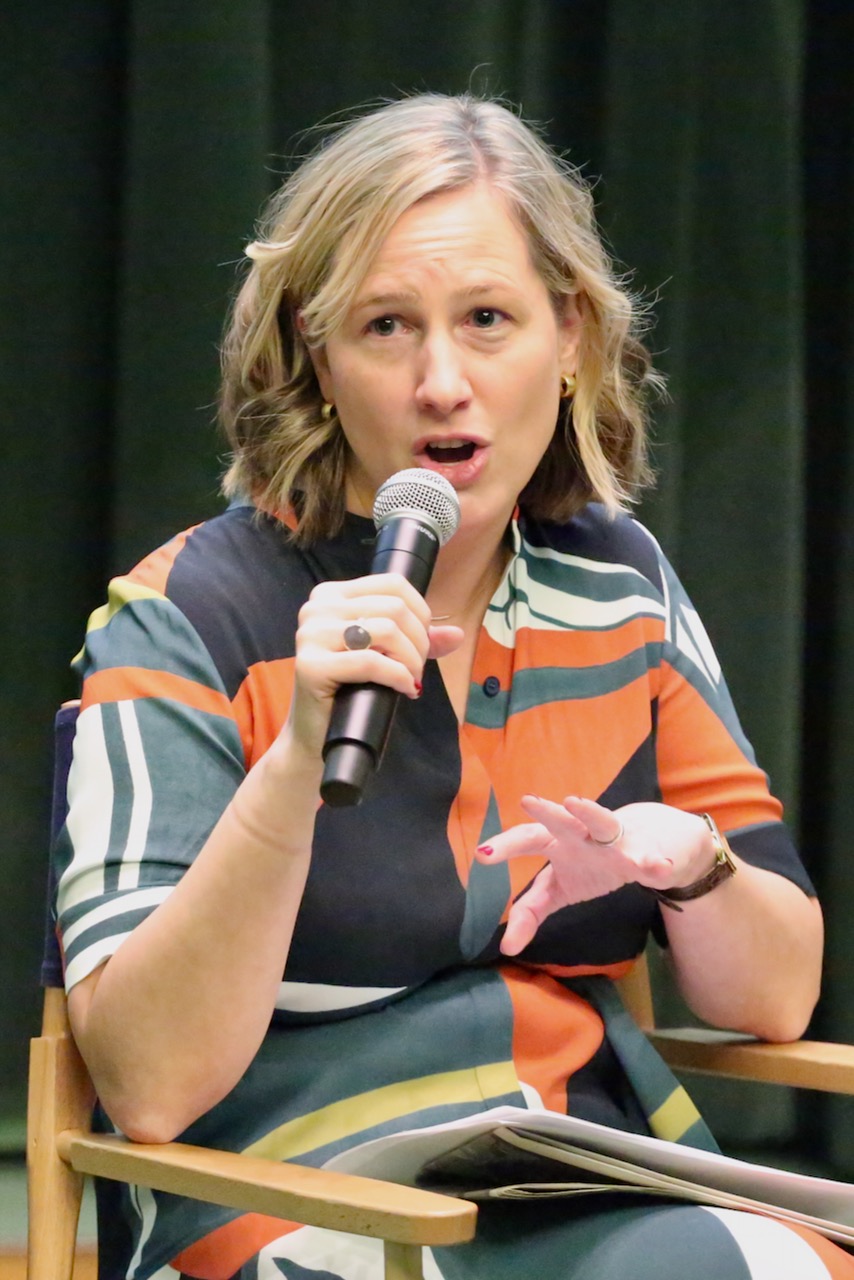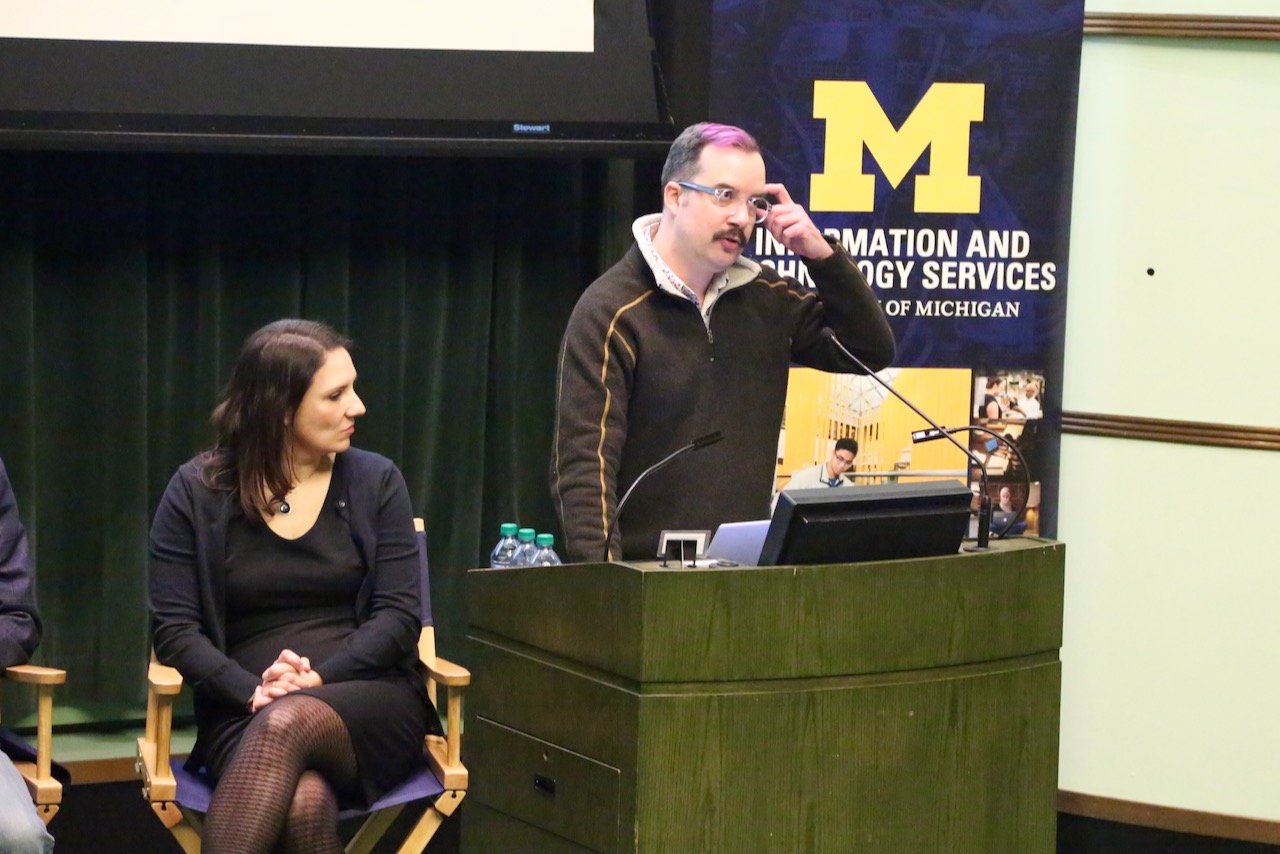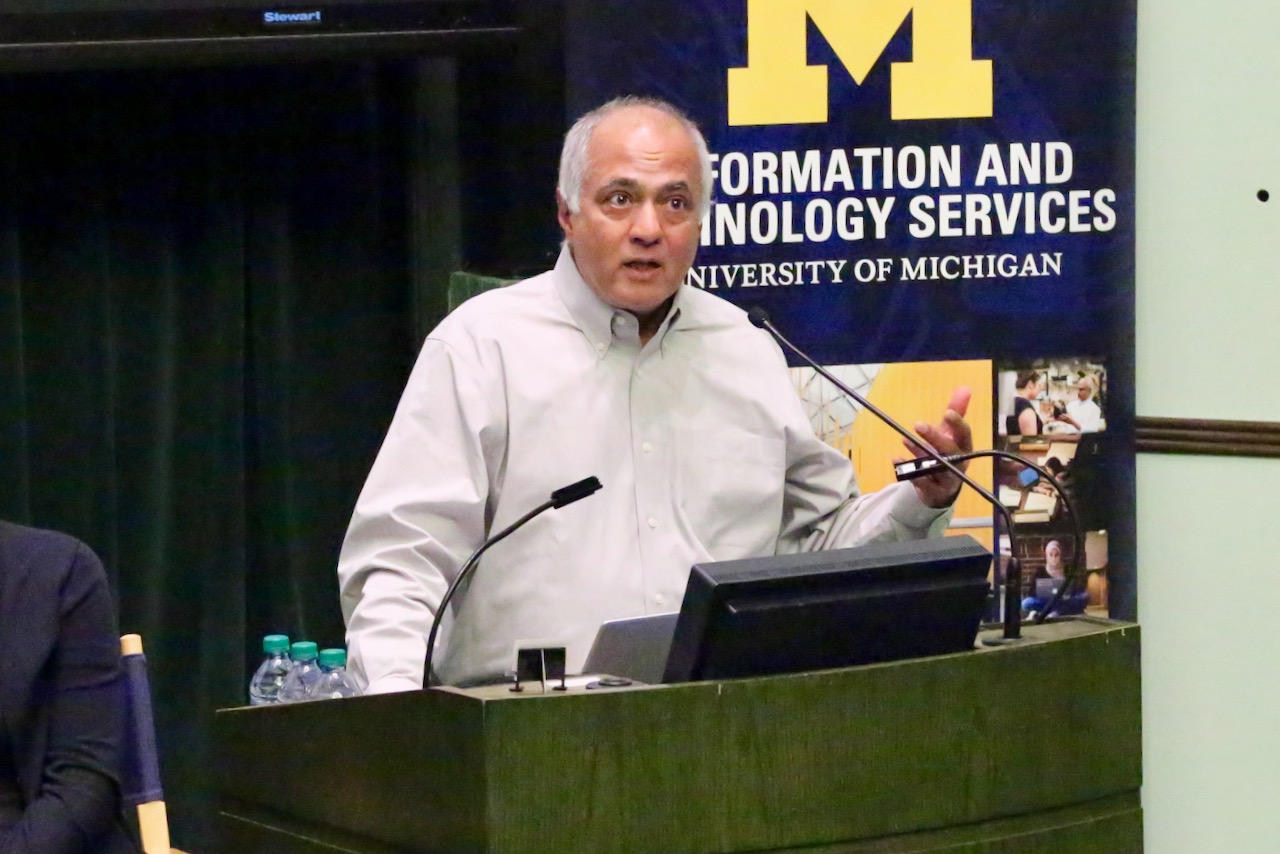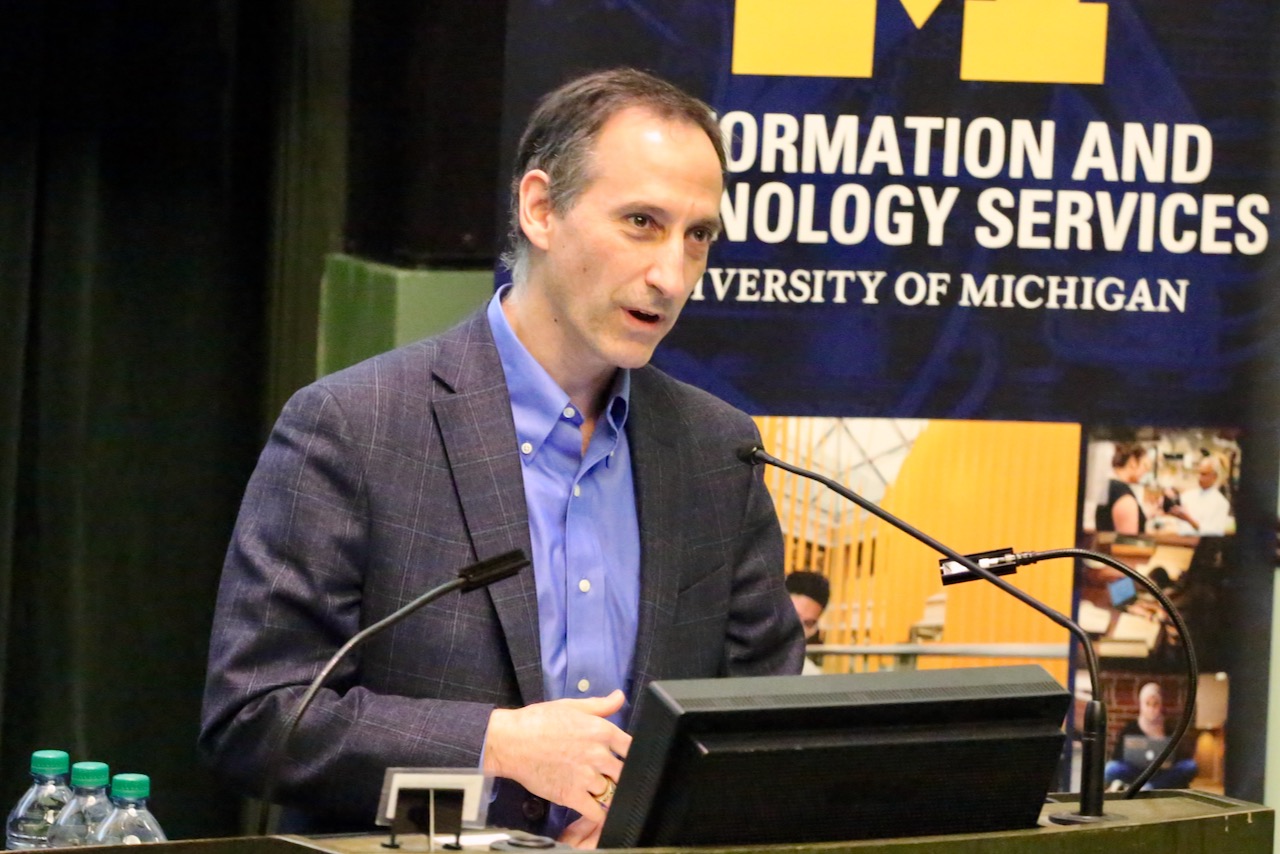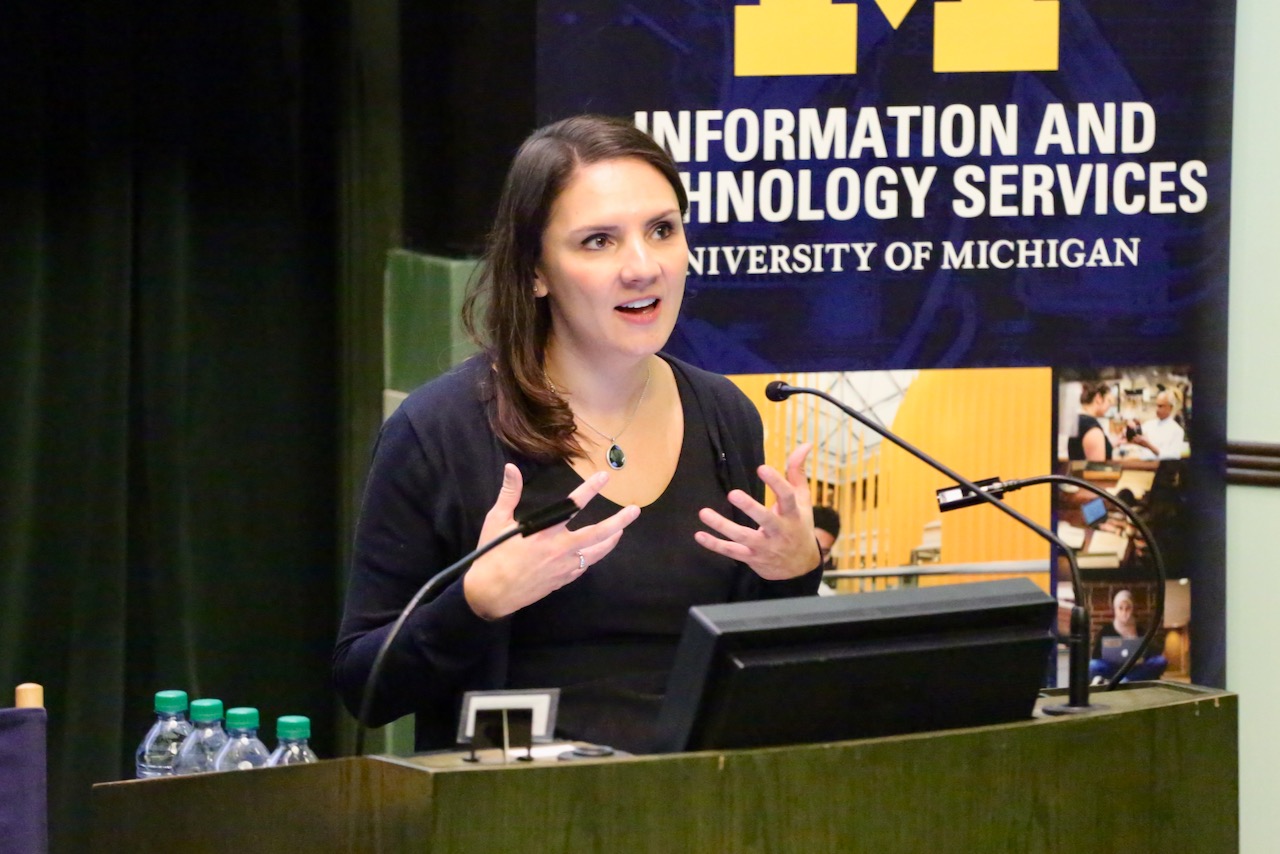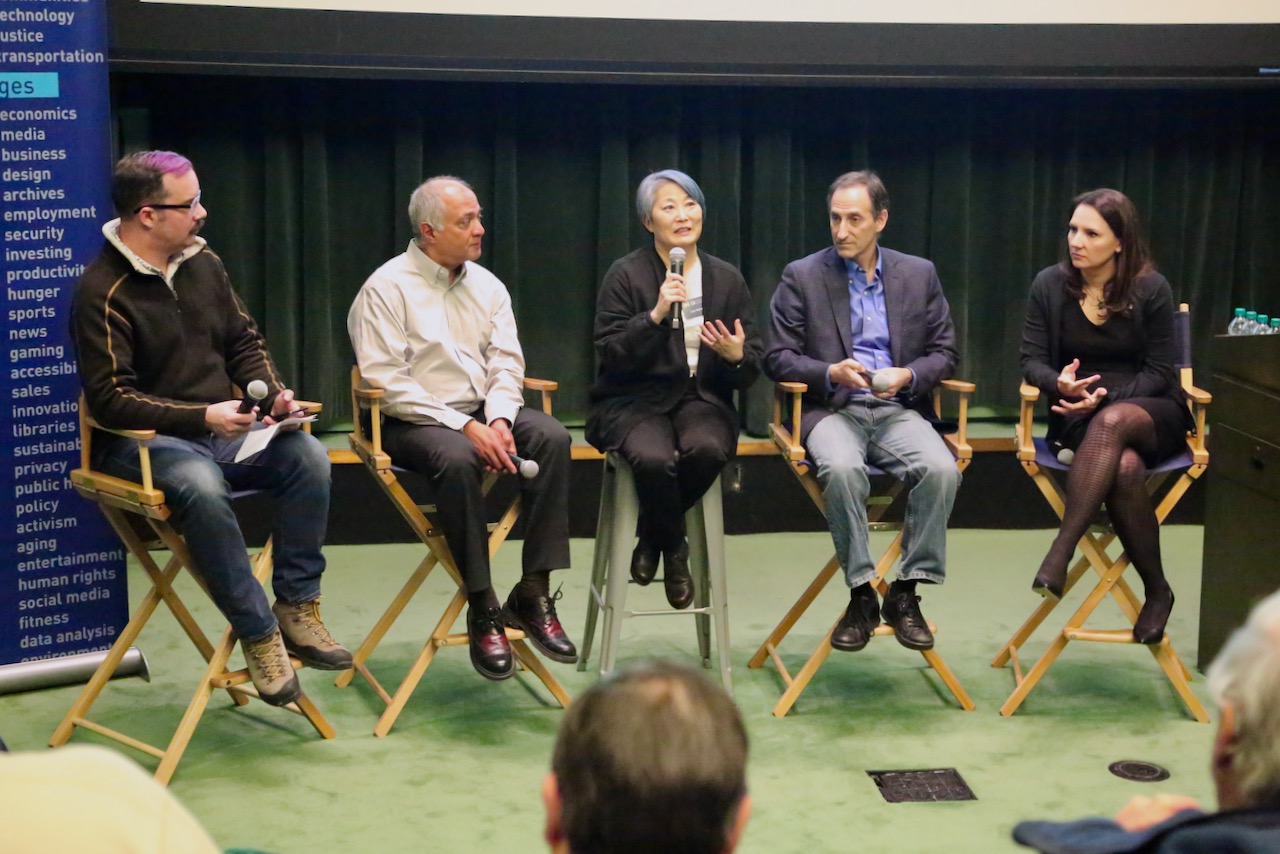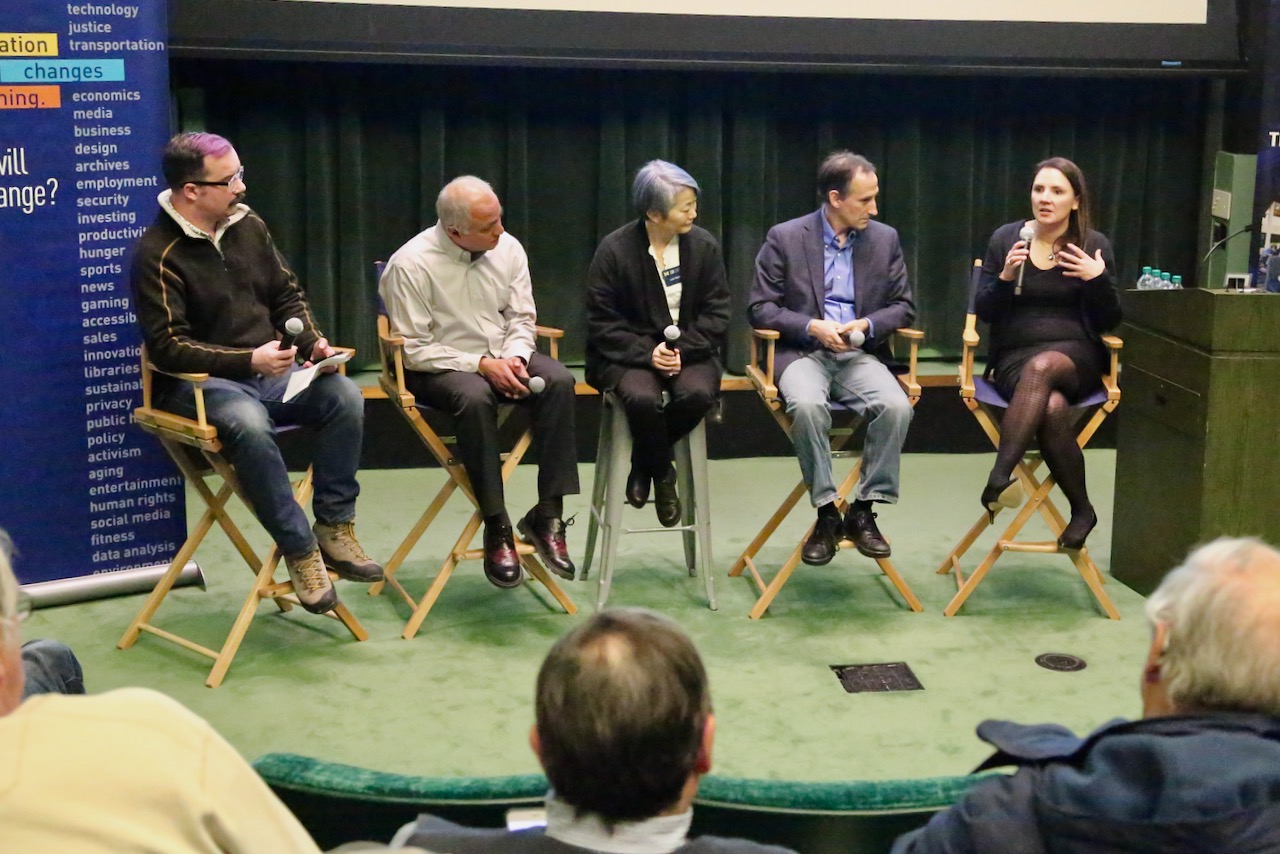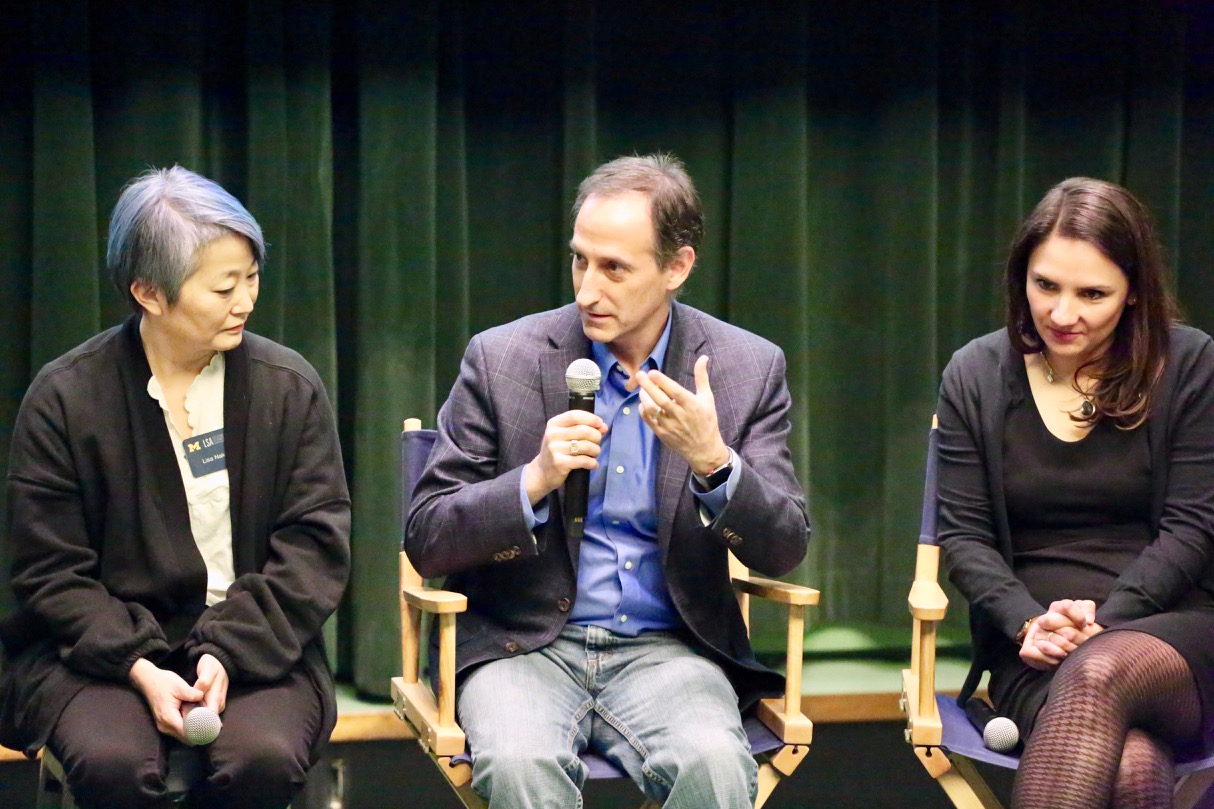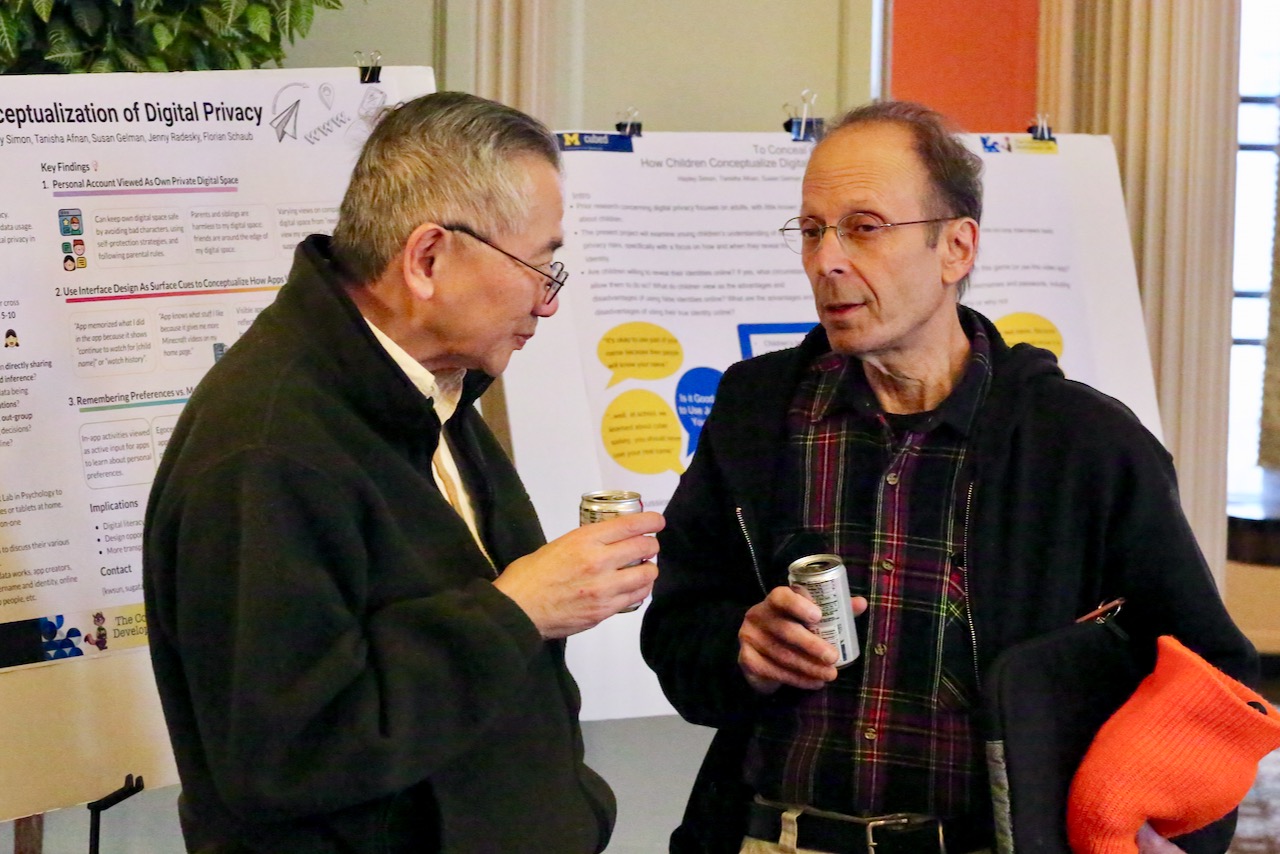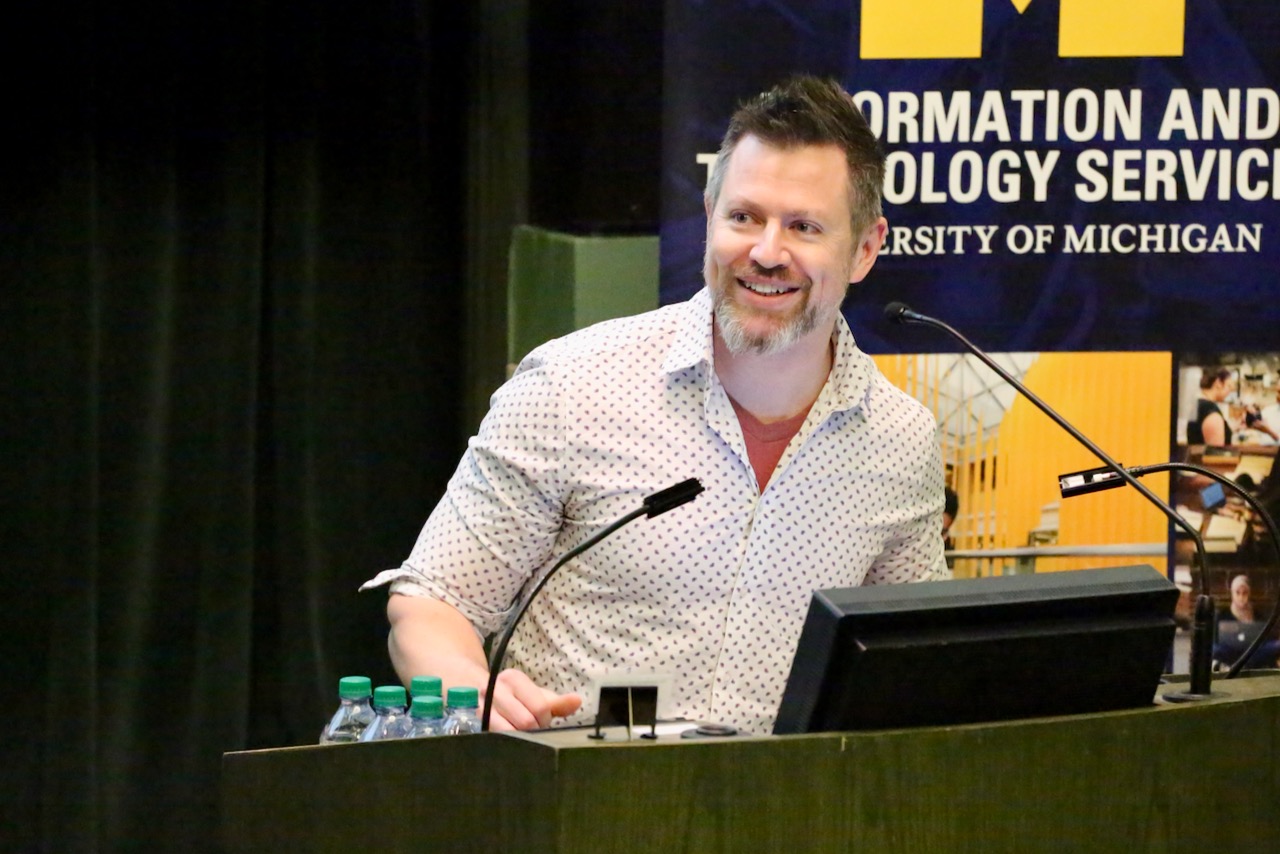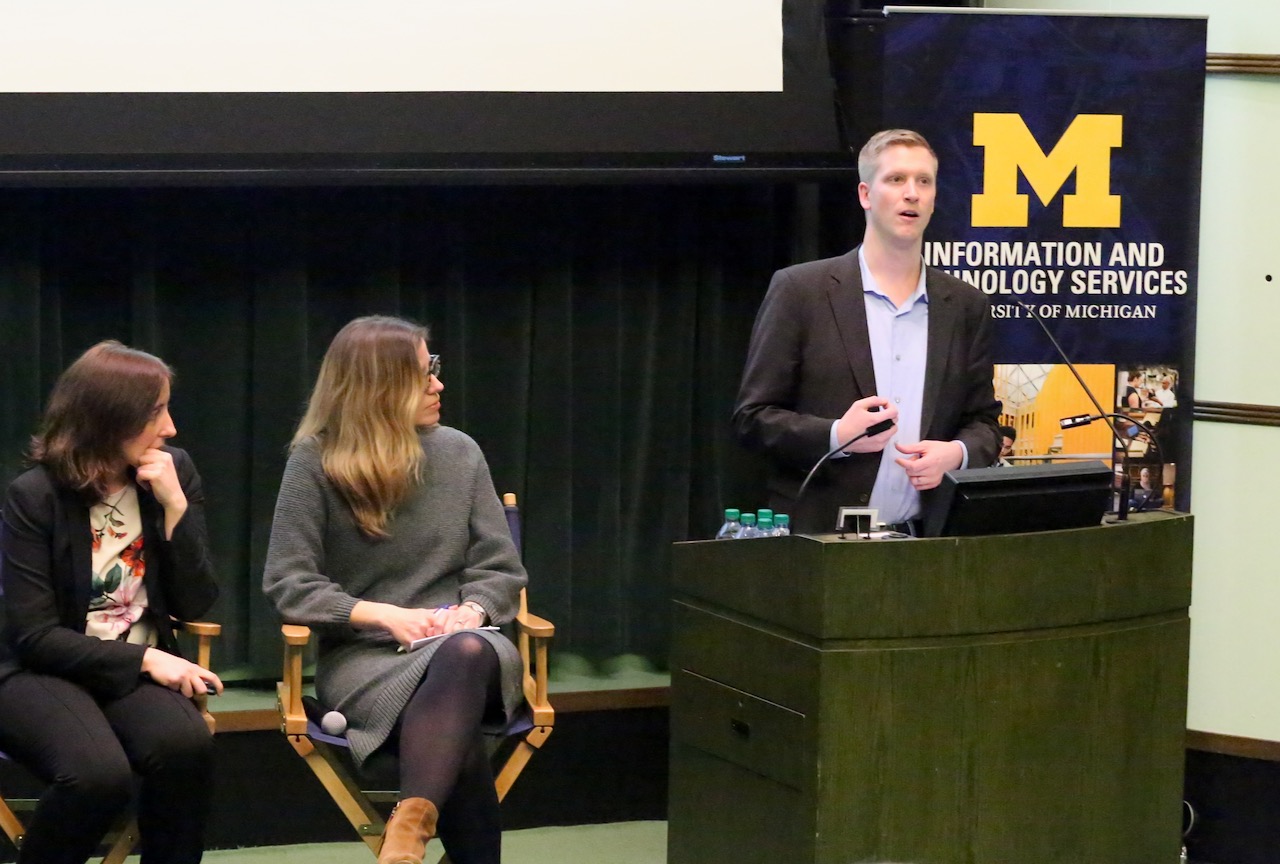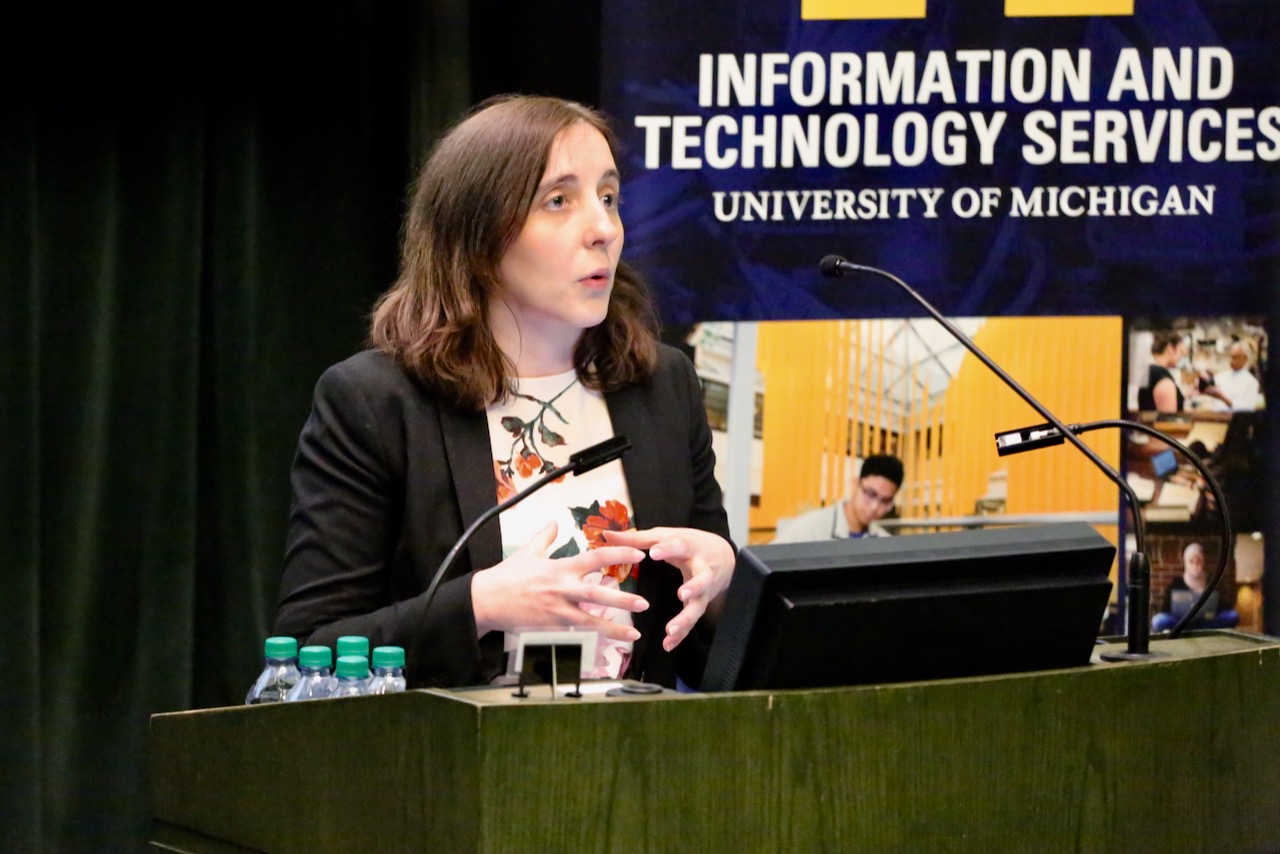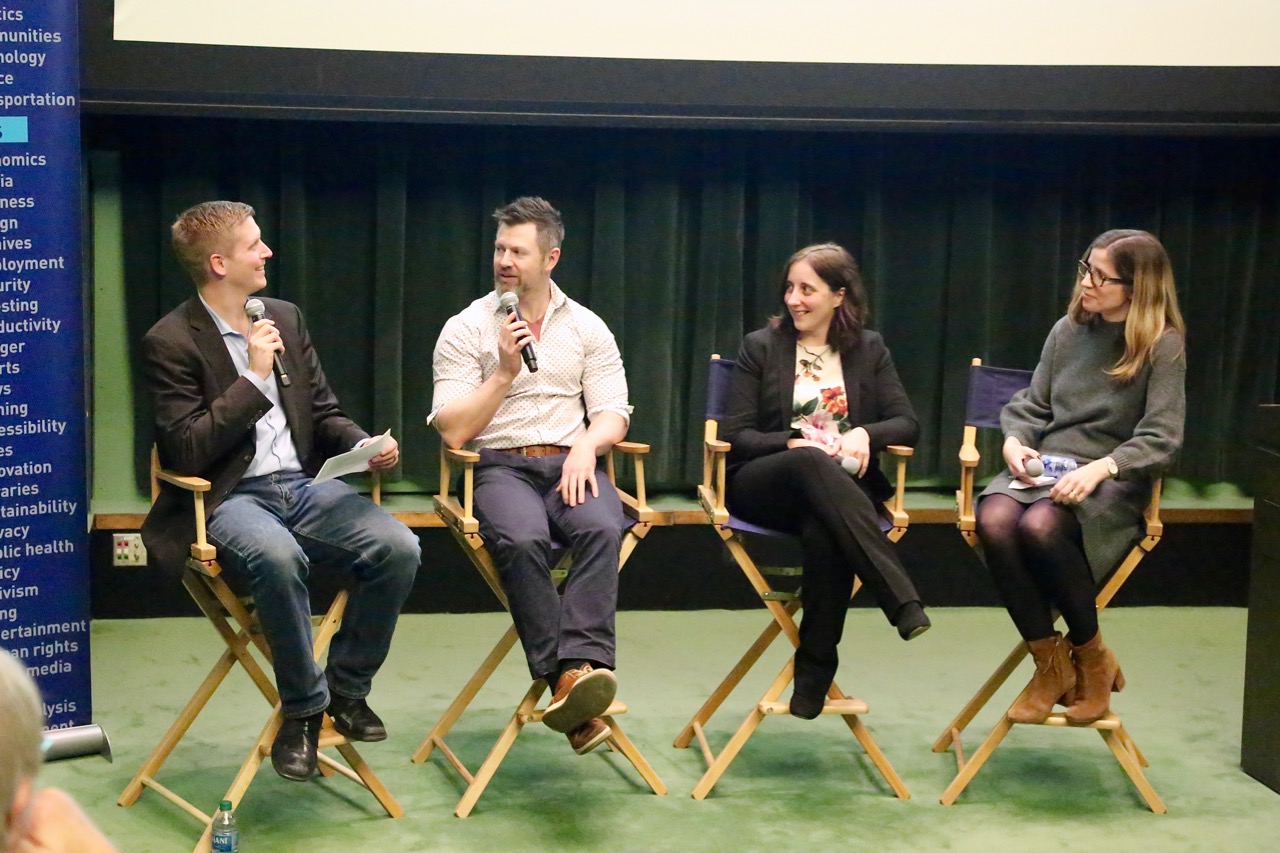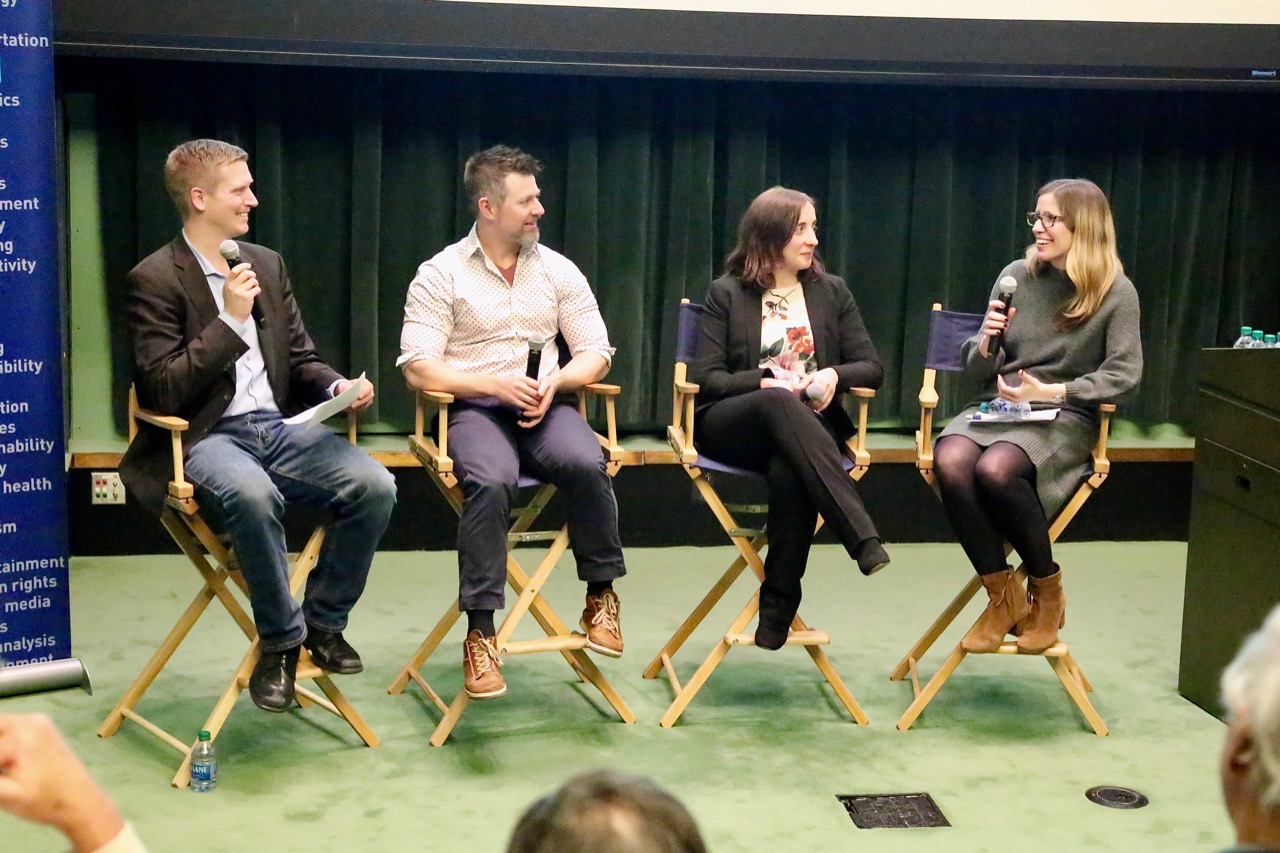Date
Tuesday, January 28, 2020
A Celebration of International Data Privacy Day
The 2020 Privacy@Michigan Symposium & Research Showcase was a tremendous way to celebrate Data Privacy Week. Faculty, researchers, students and staff from across the university, as well as professionals from around the region, came together for multidisciplinary conversations about privacy’s role in society — here at U-M and worldwide.
A privacy fair including a privacy clinic, was open during breaks and the closing reception. Students helped people with general privacy questions and displayed posters showcasing privacy research at the University of Michigan. Social media was abuzz with conversation throughout the day and attendees were also encouraged to share their thoughts about privacy in six words based on the Privacy and Security Six Words Project. The Six Words About Privacy website remains open and you are invited to share your six words and see what others have shared.
Presentations and Videos
Welcome and Opening Remarks
Florian Schaub, Assistant Professor of Information, School of Information, and Sol Bermann, Executive Director, ITS Information Assurance and Chief Information Security Officer welcomed attendees to the Privacy@Michigan 2020 event. Thomas Finholt, Dean and professor of information in the U-M School of Information and Ravi Pendse, Vice President for Information Technology and Chief Information Officer for the University of Michigan shared opening remarks.
Keynote Presentation
Kathleen Kingsbury, editor of The New York Times Privacy Project, gave the keynote speech at Privacy@Michigan 2020 followed by "fireside chat" with Sol Bermann, U-M Chief Information Security Officer.
Interdisciplinary Panel Discussion #1
It Takes a Village: Multi-Disciplinary Voices on Privacy and Ethics in a Hyper-Connected Age
Panelists: Christian Sandvig, Director, U-M Center for Ethics, Society, and Computing (ESC); Lisa Nakamura, Director, U-M Digital Studies Institute; Paul Resnick, Director, U-M Center for Social Media Responsibility; Kayte Spector-Bagdady, Chief, Research Ethics Service, U-M Center for Bioethics and Social Sciences in Medicine; and H.V. Jagadish, Director of the Michigan Institute for Data Science
Interdisciplinary Panel Discussion #2
I Always Feel Like Someone Is Listening to Me: Voice Assistants, the Internet of Things, and Privacy
Panelists: Florian Schaub, Assistant Professor of Information, U-M School of Information; David Jurgens, Assistant Professor of Information, U-M School of Information; Sara Rampazzi, Research Investigator, Electrical Engineering and Computer Science; and Jenny Radesky, Assistant Professor of Pediatrics, U-M Medical School
Photo Gallery
Click on an image to view it larger and scroll through the gallery. (Photos by Joel Iverson, ITS Communication)
-
Speakers

Kathleen Kingsbury
Deputy Editorial Page Editor & Editor, New York Times Privacy Project
Keynote Speaker
Kathleen Kingsbury is deputy editorial page editor at The New York Times. She joined The Times in 2017 from the Boston Globe, where she served as managing editor for digital.
Kingsbury joined the Globe’s editorial board in 2013 and later edited the Ideas section, an influential, original Sunday section at the Globe with a tradition of tackling the new thinking, intellectual trends, and big ideas that shape our world. In this role, Kingsbury was also deputy managing editor for the paper and the deputy editorial page editor.
Kingsbury was awarded the 2015 Pulitzer Prize for distinguished editorial writing for a series on low wages and the mistreatment of workers in the restaurant industries. The same 8-part series, called “Service Not Included,” also received the Scripps-Howard Foundation’s 2014 Walker Stone Award for Editorial Writing and the Burl Osborne Award for Editorial Leadership from the American Society of News Editors. She also edited the Globe’s 2016 Pulitzer Prize-winning commentary on race and education.
Kingsbury has also worked as a New York-based staff writer and Hong Kong-based foreign correspondent for Time Magazine. In addition, she has contributed to CNN, Reuters, the Daily Beast, BusinessWeek, and Fortune.
After growing up in Portland, Ore., Kingsbury studied as an undergraduate at Georgetown University’s Walsh School of Foreign Service. She also has a graduate degree from the Columbia Journalism School, where she was awarded the Pulitzer Traveling Fellowship.

Sol Bermann
Executive Director, Information Assurance and Chief Information Security Officer
Co-Host
Sol Bermann is the Executive Director of Information Assurance and Chief Information Security Officer for the University of Michigan. Appointed to the role in June 2019, Sol is responsible for the university's information assurance (IT security, privacy, IT policy, compliance, and enterprise continuity) program, including Ann Arbor, Flint, Dearborn, and the Health System.
Since joining the university in 2011, Sol has served as the University Privacy Officer, and IT Policy and Compliance Strategist. In this role he has, among other things, provided strategic direction in how the institution engages cloud services; implemented the policy on the use of personally owned devices when working with sensitive data,; coordinated efforts related to securing sensitive research data, university data governance, and the development of proposed learning analytics guiding principles; and development of the university’s Sensitive Data Guide to IT Services. He served as Interim Chief Information Security Officer during the 2014/15 and 2017/19 academic years.
Prior to joining U-M, Sol was the Director of International Privacy at Walmart, and previous to that was Chief Privacy Officer for the State of Ohio. He began his career as Operations Manager of the Technology Policy Group, a non-profit organization affiliated with the Ohio SuperComputer Center and The Ohio State University. He later served as Associate Director of the Center for Interdisciplinary Law and Policy Studies at The Ohio State University Moritz College of Law, and was adjunct faculty in Ohio State’s International Studies Program.
Sol is active in the EDUCAUSE Higher Education Chief Privacy Officer Working Group, where he served as co-chair through 2016, and was a member of the EDUCAUSE Higher Education Information Security Council. He has written numerous publications, including co-authoring “Information Privacy: Official Reference for the Certified Information Privacy Professional.” He also has presented on privacy, IT policy and information security at numerous conferences, workshops and forums.
Sol holds a B.A from Beloit College, a M.A. from the University of Virginia, and a J.D. from the The Ohio State University Moritz College of Law. He is married and lives in Ann Arbor. He is an artist, primarily working in mixed media and photography, and loves the wide variety of cultural offerings the university and the city provide.
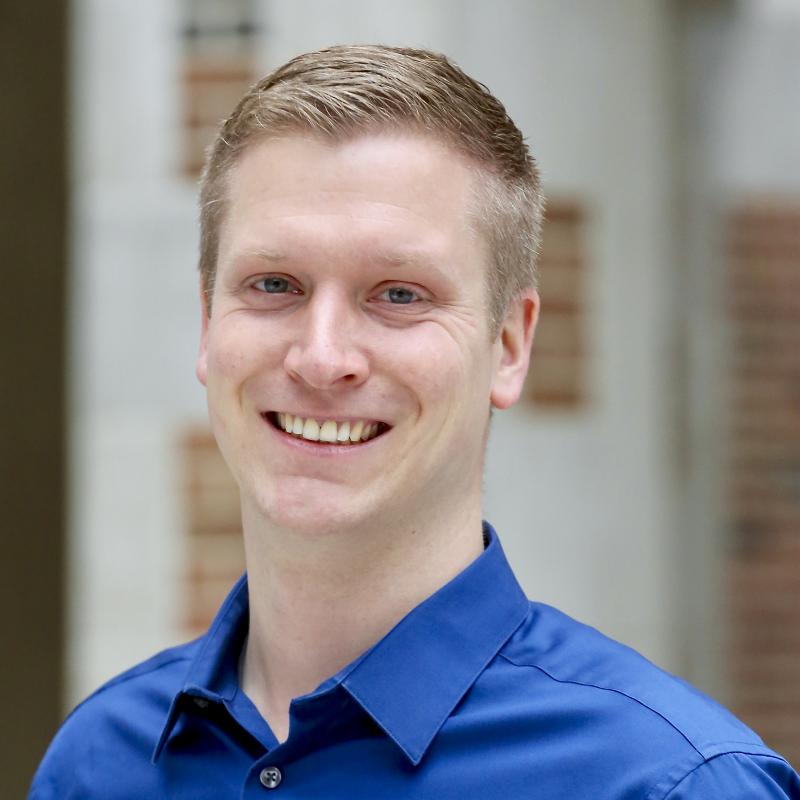
Florian Schaub
Assistant Professor of Information, School of Information, and Assistant Professor of Electrical Engineering and Computer Science, College of Engineering, University of Michigan
Co-Host and Panelist: I Always Feel Like Someone Is Listening to Me: Voice Assistants, the Internet of Things, and Privacy
Florian Schaub is an assistant professor in the School of Information. His research focuses on empowering users to effectively manage their privacy in complex socio-technological systems. His research interests span privacy, human-computer interaction, mobile and ubiquitous computing, and the Internet of Things. Before joining the University of Michigan, he was a postdoctoral fellow in the School of Computer Science at Carnegie Mellon University. He received his doctoral degree and Diploma in Computer Science from the University of Ulm, Germany, and a Bachelor in Information Technology from Deakin University, Australia.
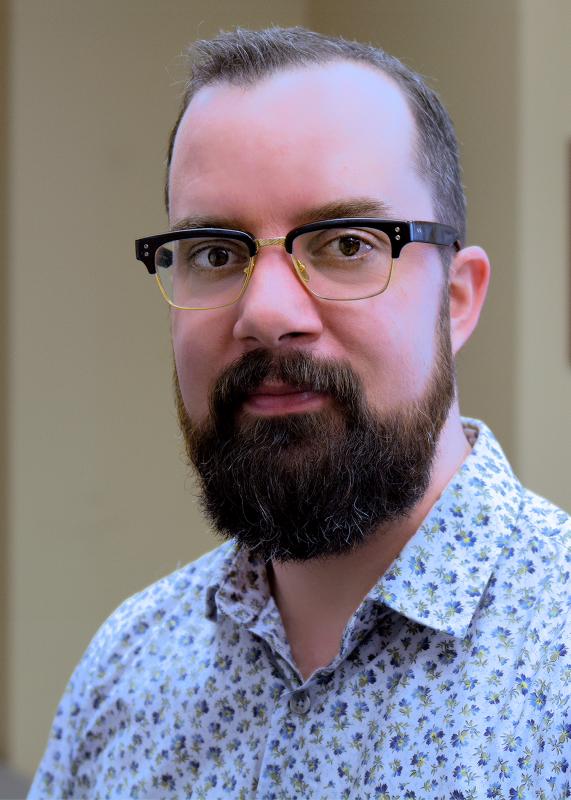
Christian Sandvig
Director, Center for Ethics, Society, and Computing (ESC) H. Marshall McLuhan Collegiate Professor of Digital Media, School of Information, LSA Department of Communication Studies at the University of Michigan
Panelist: It Takes a Village: Multi-Disciplinary Voices on Privacy and Ethics in a Hyper-Connected Age
Sandvig is a faculty member at the School of Information specializing in information infrastructure and social media. His current work focuses on the implications of algorithmic systems that filter and curate culture. Before moving to Michigan, Sandvig taught at the University of Illinois at Urbana-Champaign and Oxford University. Sandvig's research has been covered by The Economist, The New York Times, Le Monde, National Public Radio, CBS News, and other media outlets. His own writing appears in Wired and The Guardian. His work has been funded by the National Science Foundation, the MacArthur Foundation, and the Social Science Research Council. He has consulted for Intel, Microsoft, and the San Francisco Public Library.
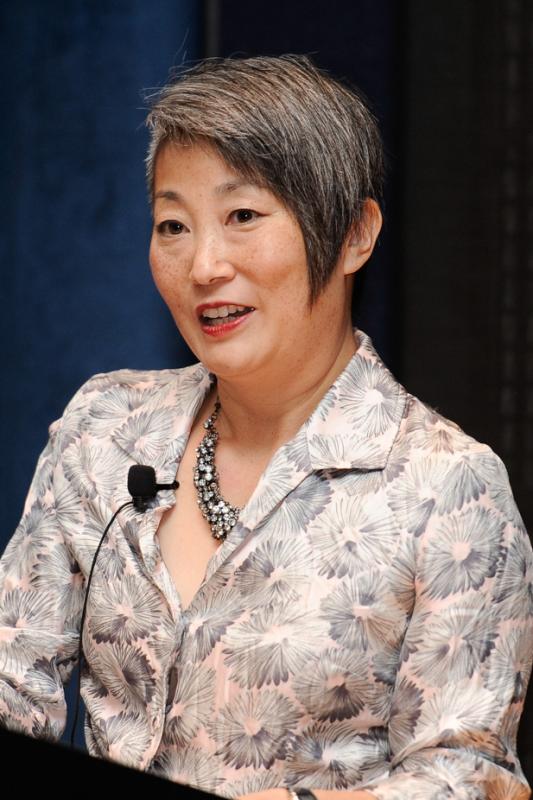
Lisa Nakamura
Director, Digital Studies Institute, Gwendolyn Calvert Baker Collegiate Professor, LSA Department of American Culture at the University of Michigan
Panelist: It Takes a Village: Multi-Disciplinary Voices on Privacy and Ethics in a Hyper-Connected Age
Lisa Nakamura is the Gwendolyn Calvert Baker Collegiate Professor in the Department of American Cultures at the University of Michigan, Ann Arbor. She is the Coordinator of Digital Studies at the University of Michigan and serve on the Steering Committee of the FemTechNet Project, a network of educators, activists, librarians, and researchers interested in digital feminist pedagogy. Nakamura written about digital media since 1994. She has faculty affiliations with the Departments of English, Screen Arts and Culture, Women and Gender Studies, and the Asian and Pacific Islander Studies Program.

Paul Resnick
Director, Center for Social Media Responsibility, Michael D Cohen Collegiate Professor of Information, Associate Dean for Research and Faculty Affairs, School of Information at the University of Michigan
Panelist: It Takes a Village: Multi-Disciplinary Voices on Privacy and Ethics in a Hyper-Connected Age
Paul Resnick is the Michael D. Cohen Collegiate Professor of Information and Associate Dean for Research and Faculty Affairs at the University of Michigan School of Information. He previously worked as a researcher at AT&T Labs and AT&T Bell Labs, and as an Assistant Professor at the MIT Sloan School of Management. He received the master's and Ph.D. degrees in Electrical Engineering and Computer Science from MIT, and a bachelor's degree in mathematics from the University of Michigan.
Professor Resnick's research focuses on SocioTechnical Capital, productive social relations that are enabled by the ongoing use of information and communication technology. His current projects include nudging people toward politically balanced news consumption and health behavior change, and crowdsourcing rumor tracking and fact-correction on the Internet.
Resnick was a pioneer in the field of recommender systems (sometimes called collaborative filtering). Recommender systems guide people to interesting materials based on recommendations from other people. The GroupLens system he helped develop was awarded the 2010 ACM Software Systems Award. His articles have appeared in Scientific American, Wired, Communications of the ACM, The American Economic Review, Management Science, and many other venues. His 2012 MIT Press book (co-authored with Robert Kraut), was titled “Building Successful Online Communities: Evidence-based Social Design”.

Kayte Spector-Bagdady
Chief, Research Ethics Service, Center for Bioethics and Social Sciences in Medicine; Assistant Professor, Department of Obstetrics and Gynecology, University of Michigan Medical School
Panelist: It Takes a Village: Multi-Disciplinary Voices on Privacy and Ethics in a Hyper-Connected Age
Kayte Spector-Bagdady, Assistant Professor in the Department of Obstetrics and Gynecology at the University of Michigan Medical School and the Chief of the Research Ethics Service in the Center for Bioethics and Social Sciences in Medicine, is a lawyer/bioethicist who focuses on the secondary research use of health data and biospecimens. Her research has been funded by the National Human Genome Research Institute, the Greenwall Foundation, and the Michigan Institute for Clinical & Health Research. She currently holds an NIH Career Development Award studying the genetic data-sharing market with a focus on agreements between private industry and academic medical centers. Her recent work has been published in Science, JAMA Oncology, the Journal of Clinical Oncology, Genetics in Medicine, Health Affairs, and the American Journal of Obstetrics and Gynecology among others.
At U-M she serves as Chair of the Research Ethics Committee, the ethicist on the Michigan Medicine Human Data and Biospecimen Release Committee, and a clinical ethicist. She is also on the Board of Directors for the American Society for Bioethics & Humanities.
Prof. Spector received her J.D. and M.Bioethics from the University of Pennsylvania Law School and School of Medicine respectively after graduating from Middlebury College. She completed a research fellowship in bioethics at Michigan Medicine. She is also a former practicing drug and device attorney and was Associate Director of the Presidential Commission for the Study of Bioethical Issues under President Obama (2010–2015).

H.V. Jagadish
Bernard A Galler Collegiate Professor of Electrical Engineering and Computer Science, Professor of Electrical Engineering and Computer Science, College of Engineering and Director of the Michigan Institute for Data Science at the University of Michigan.
Panelist: It Takes a Village: Multi-Disciplinary Voices on Privacy and Ethics in a Hyper-Connected Age
H. V. Jagadish is Bernard A Galler Collegiate Professor of Electrical Engineering and Computer Science at the University of Michigan in Ann Arbor. Prior to 1999, he was Head of the Database Research Department at AT&T Labs, Florham Park, NJ.
Professor Jagadish is well known for his broad-ranging research on information management, and has approximately 200 major papers and 37 patents. He is a fellow of the ACM, “The First Society in Computing,” (since 2003) and serves on the board of the Computing Research Association (since 2009). He has been an Associate Editor for the ACM Transactions on Database Systems (1992-1995), Program Chair of the ACM SIGMOD annual conference (1996), Program Chair of the ISMB conference (2005), a trustee of the VLDB (Very Large DataBase) foundation (2004-2009), Founding Editor-in-Chief of the Proceedings of the VLDB Endowment (2008-2014), and Program Chair of the VLDB Conference (2014).Ê Since 2016, he is Editor of the Morgan & Claypool Synthesis Lecture Series on Data Management. Among his many awards, he won the ACM SIGMOD Contributions Award in 2013 and the David E Liddle Research Excellence Award (at the University of Michigan) in 2008.

David Jurgens
Assistant Professor of Information, School of Information and Assistant Professor of Electrical Engineering and Computer Science, College of Engineering
Panelist: I Always Feel Like Someone Is Listening to Me: Voice Assistants, the Internet of Things, and Privacy
David Jurgens is an assistant professor in the School of Information at the University of Michigan. He holds a PhD from the University of California Los Angeles and was a postdoctoral scholar in the Department of Computer Science at Stanford University and prior at McGill University. His research combines natural language processing, network science and data science to discover, explain and predict human behavior in large social systems. His research has been published in top computational social science and natural language processing venues including PNAS, WWW, ACL, ICWSM, EMNLP, and others. His work has won the Cozzarelli Prize from the National Academy of Science, Cialdini Prize from the Society for Personality and Social Psychology, best paper at ICWSM, best paper nominations at ACL and SociInfo, and has been featured in news outlets such as the BBC, Time, MIT Technology Review, Times of India, and Forbes.

Sara Rampazzi
Research Investigator, Electrical Engineering and Computer Science and Intermittent Lecturer in Electrical Engineering and Computer Science, College of Engineering
Panelist: I Always Feel Like Someone Is Listening to Me: Voice Assistants, the Internet of Things, and Privacy
Sara Rampazzi is a Research Investigator at the Electrical Engineering and Computer Science Department at the University of Michigan. She holds a Ph.D. from the University of Pavia (Italy). Rampazzi’s research focuses on hardware security, in particular on defending cyber-physical systems and their sensors against hardware-based vulnerabilities. In her last project, she discovers how to inject inaudible and invisible commands to smart home devices, such as Amazon Alexa and Google Home. Rampazzi's research has been covered by CNN, The New York Times, Ars Technica, Wired, ABC and NBC News, and other media outlets.
In her research, she also tackles the fundamental challenges necessary to protect health information systems from signal injection attacks and aims to redefine fundamental hardware-software interactions to allow autonomous transportation systems to remain reliable despite untrustworthy data from sensors and hardware components. Besides co-supervising graduate and undergraduate students, Rampazzi is also an intermittent lecturer in the EECS department.

Jenny Radesky, MD
Assistant Professor of Pediatrics, Medical School, University of Michigan
Panelist: I Always Feel Like Someone Is Listening to Me: Voice Assistants, the Internet of Things, and Privacy
Dr. Radesky is a Developmental Behavioral Pediatrician and Assistant Professor of Pediatrics at the University of Michigan Medical School. She received her M.D. from Harvard Medical School, trained in Pediatrics at Seattle Children’s Hospital, and completed subspecialty training in Developmental Behavioral Pediatrics at Boston Medical Center. Her NIH-funded research focuses on the use of mobile/interactive technology by parents and young children and how this relates to child self-regulation and parent-child interaction. Clinically, her work focuses on developmental and behavioral conditions in low-income and underserved populations. She was the lead author of the American Academy of Pediatrics (AAP) guidelines about media use by young children in 2016, and works to translate digital media research for families through her collaborations with the AAP and Melissa & Doug Toys.
Twitter: @jennyradesky
About Privacy@Michigan
Privacy@Michigan, hosted by the University of Michigan School of Information and U-M Information Assurance, brings together faculty, researchers, students and staff from different colleges, schools and units across campus and aims to spark ongoing, multidisciplinary conversations about privacy’s role in society—here at U-M and worldwide. Privacy@Michigan is co-sponsored by:
View video recordings, slides and other information from previous Privacy@Michigan symposiums on the main Privacy@Michigan webpage.


